Health
12 Common Plants that are Poisonous to Dogs

Did you know that the same plants your dog enjoys sniffing during daily walks could potentially poison them? Poisonous plants are more common than you think and they may be hidden in your backyard or inside your house.
Take a look at a list of 12 of the most common plants that are poisonous to your dog.
1. Aloe Vera (Mild Toxicity)

Although the aloe vera plant is very healing for humans, it is very toxic for dogs. The plant is composed of glycosides, which has a powerful laxative effect on dogs and results in heightened levels of mucus and water in the colon. In some cases, aloe vera can be so toxic that it breaks down a canine’s red blood cells.
Common Signs of Aloe Vera Poisoning:
- Excessive diarrhea
- Vomiting
- Anorexia
- Depression and a noticeable change in urine color
2. Daffodils (Mild Toxicity)

Lycorine, a toxic substance found in daffodils, induces vomiting in dogs upon digestion and the bulb of the flower causes severe irritation of tissue in dogs.
Common Signs of Daffodil Poisoning:
- Abdominal pain
- Drooling
- Fast heart rate
- Irregular heartbeat
- Abnormal breathing
- Vomiting
- Diarrhea
3. Caladium (Mild Toxicity)
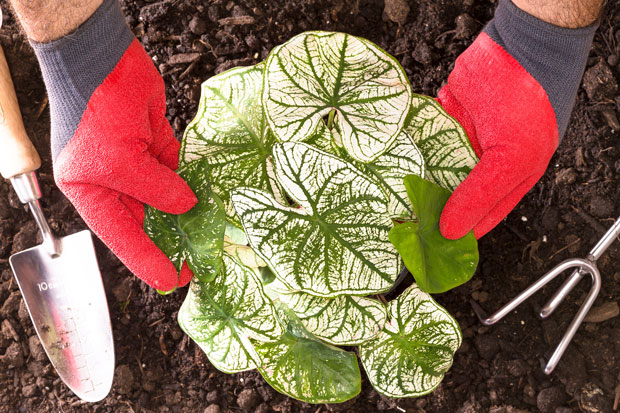
The common houseplant, Caladium, contains calcium oxalate acid. The crystals from the acid attach themselves onto the dog’s mouth and skin, which can cause swelling of the airway making it hard to breathe.
Common Signs of Caladium Poisoning:
- Pawing at the face/mouth
- Pain of the mouth
- Minimal appetite
- Vomiting
- Drooling
4. Eucalyptus (Mild Toxicity)
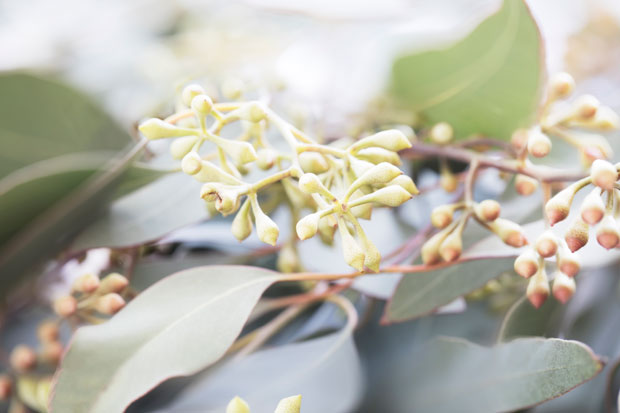
This popular plant used for aromatherapy should be kept away from dogs. Upon consumption, eucalyptus impairs a dog’s brain function and irritates the gastrointestinal tract.
Common Signs of Eucalyptus Poisoning:
- Seizures
- Confusion
- Depression
- Dilated eyes
- Shallow breathing
- Muscle weakness
- Decreased appetite
- Pawing at face/mouth
- Drooling
5. Asparagus Fern (Mild Toxicity)
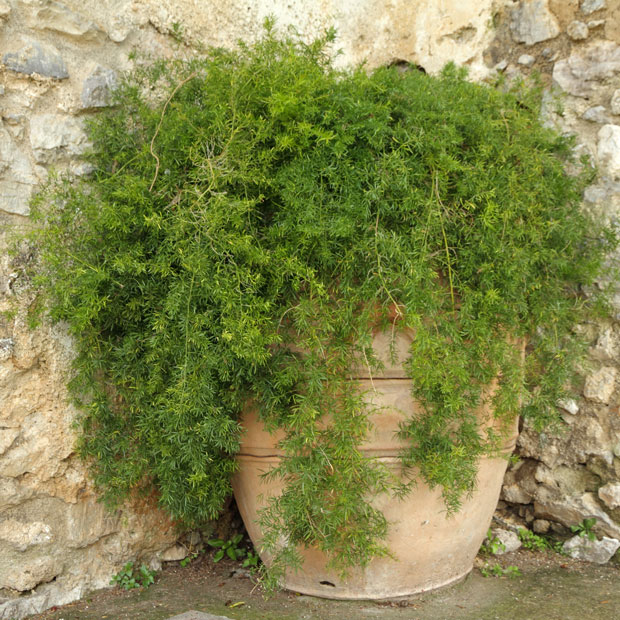
While most plants are only poisonous to dogs upon digestion, asparagus fern is poisonous externally as well. This common houseplant irritates the gastrointestinal tract when consumed and irritates the dog’s skin when external contact is made.
Common Signs of Asparagus Fern Poisoning:
- Abdominal pain
- Vomiting
- Diarrhea
- Skin irritation
6. Jade (Mild Toxicity)

Although the toxic substances in Jade are not yet known, what is known is that this plant is very toxic to dogs. Consumption of this plant can cause symptoms that are hard to identify but must be treated.
Common Signs of Jade Poisoning:
- Aggression
- Abdominal pain
- Vomiting
- Weakness
- Lethargy
- Depression
- Incoordination
7. Tulips (Mild Toxicity)

This plant is composed of glycosides, which are alkaloids that are toxic to dogs. The bulb of the tulip is the most poisonous part of the plant because that is where the highest concentration of the alkaloids can be found.
Common Signs of Tulip Poisoning:
- Increased heart rate
- Difficulty breathing
- Vomiting
- Diarrhea
- Nausea
8. Epipremnum Aureum/Devil’s Ivy (Mild Toxicity)
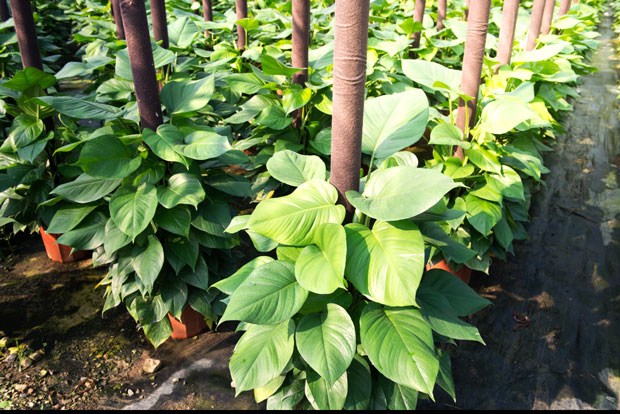
This plant produces calcium oxalate crystals, which are insoluble. As a result of the crystals being insoluble, they cut the tissue of the dog’s mouth and causes damage. The leaves are the most poisonous portion of this plant because that is where the highest concentration of the toxins can be found.
Common Signs of Epipremnum Aureum Poisoning:
- Pawing at the mouth/face
- Eye, mouth, lip, or tongue irritation
- Foaming at the mouth
- Inflammation of the mouth
- Difficulty swallowingß
9. Bird of Paradise (Mild Toxicity)
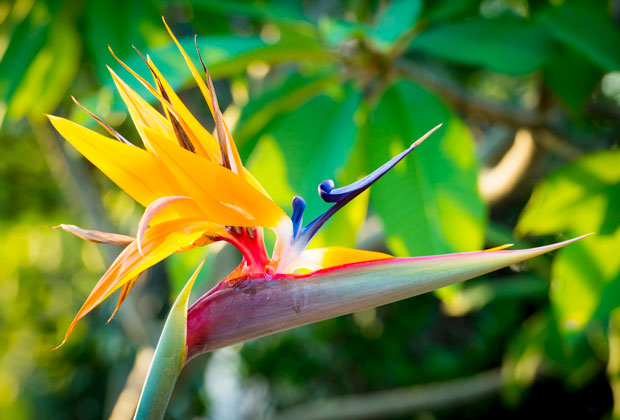
This popular garden plant contains a toxic substance called hydrocyanic acid. Hydrocyanic acid is a substance that leads to cell necrosis in dogs and can be lethal upon digestion of large amounts.
Common Signs of Bird of Paradise Poisoning:
- Dehydration
- Muscle tremors
- Increased heart rate
- Nausea
- Vomiting
- Diarrhea
- Incoordination
10. Azalea (Mild to Severe Toxicity)

This common flower contains a substance called grayantoxins, which affect the proper functioning of dogs’ muscle, heart, or nerves. The toxic substance is found all throughout the plant, which means that a small bite of the leaves or stem is just as poisonous as a bite of the flower itself.
Common Signs of Azalea Poisoning:
- Abdominal pain
- Seizures
- Coma
- Tremors
- Depression
- Weakness
- Abnormal heart rate
- Vomiting
- Diarrhea
11. Dracaena Fragrans/Corn Plant (Severe Toxicity)

This common workplace plant is highly poisonous to dogs. Experts believe that this corn plant contains steroidal saponins, which foam in the dog’s stomach and leads to gastrointestinal irritation.
Common Signs of Dracaena Fragrans Poisoning:
- Vomiting (with blood)
- Diarrhea
- Abdominal pain
- Depression
- Anorexia
- Weakness
12. Sago Palm (Severe Toxicity)

This common houseplant carries more danger than meets the eye. Sago palm contains cycasin, which is a poisonous substance that causes liver failure in dogs. Each part of this plant is poisonous, but the nuts carry the highest amount of poison.
Ingestion of sago palm can be so toxic that symptoms could become apparent within 15 minutes and the survival rate is only 1 in every 2.
Common Signs of Sago Palm Poisoning:
- Accumulation of fluid in the abdominal area
- Lethargy
- Black stool
- Abdominal pain
- Vomiting
- Diarrhea
- Jaundice
Best Ways to Treat Plant Poisoning
If you think your dog may have ingested one of these plants, remove your dog from the area with the plant and check for any of the previously mentioned symptoms.
Treatment for plant poisoning varies on the type of plant ingested and the symptoms, so it is critical not to give your dog any home remedies or induce vomiting. Immediately notify your veterinarian for further instructions.
You can also call the ASPCA Animal Poison Control Center at (888) 426-4435 for 24/7 assistance or take your dog to a nearby animal hospital. In situations when possible, bring a sample of the plant in a container so the vet can quickly determine the best treatment plan.
It is important to keep a close eye on your pet at all times because poisonous plants are more common than you think. Do your research on the plants that your dog has access to because it’s better to be proactive than reactive when it comes to protecting your precious pet.
Recommended: The Most Toxic Foods Your Dog Should Never Have
- Topics:
- Health


